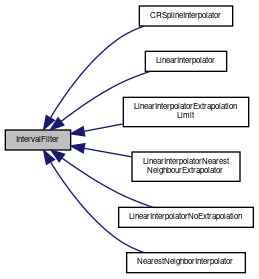Concept and base class for all Interpolators and Filters. More...
#include <math/IntervalFilter.h>

Public Member Functions | |
| bool | canExtrapolate () const |
| Returns true, if the filter/interpolator is able to extrapolate. More... | |
| int | samples () const |
| Derived class must return the total number of sample points they require for their filtering/interpolation. More... | |
| int | samplesBefore () const |
| Derived class must return the number of sample points that are desired before the interval. More... | |
| int | samplesAfter () const |
| Derived class must return the number of sample points that are desired after the interval. More... | |
| template<typename Tx , typename Ty , typename ContainerTx , typename ContainerTy > | |
| Ty | apply (const ContainerTx &x, const ContainerTy &y, const Tx &xx) |
| Filters/interpolates the specified data. More... | |
Detailed Description
Concept and base class for all Interpolators and Filters.
Interpolators and Filters can be used within the Transform framework and when obtaining values from Channels, in order to interpolate or filter these values, etc. See the corresponding documentation for more details.
Member Function Documentation
◆ canExtrapolate()
|
inline |
Returns true, if the filter/interpolator is able to extrapolate.
◆ samples()
|
inline |
Derived class must return the total number of sample points they require for their filtering/interpolation.
The caller must guarantee that the apply() method below is called exactly with the required number of samples.
◆ samplesBefore()
|
inline |
Derived class must return the number of sample points that are desired before the interval.
If canExtrapolate() yields false, then the caller must guarantee that the apply() method below is called exactly with the required number of samples before the desired interval.
◆ samplesAfter()
|
inline |
Derived class must return the number of sample points that are desired after the interval.
If canExtrapolate() yields false, then the caller must guarantee that the apply() method below is called exactly with the required number of samples after the desired interval.
◆ apply()
|
inline |
Filters/interpolates the specified data.
The data is provided as samples of data pairs within the containers x,y. The method computes the filtered data at the position xx and returns it.
The caller must guarantee the following preconditions:
- the containers x and y contain exactly the number of samples that is returned by the samples() method
- if canExtrapolate() yields false, the number of samples before the interval, xx is located in, must equal exactly the number that is returned by samplesBefore().
- if canExtrapolate() yields false, the number of samples after the interval, xx is located in, must equal exactly the number that is returned by samplesAfter().
- Parameters
-
[in] x The arguments of the control points [in] y The values of the control points for the above arguments [in] xx The argument where the value is filtered/interpolated for
The documentation for this class was generated from the following file:
- base/include/math/IntervalFilter.h
 1.8.14
1.8.14